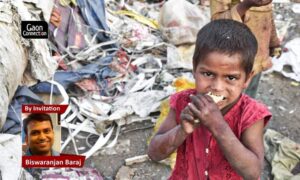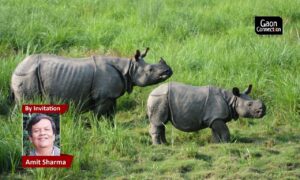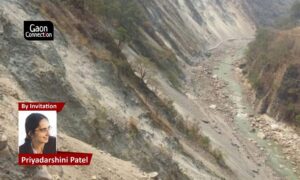In the past two decades, epidemics like the Severe Acute Respiratory Syndrome (SARS), Middle East Respiratory Syndrome (MERS), Ebola, and now the novel coronavirus, all have shaken the global economy and our society. Nature is hitting a reset button. All over the world, economies are in a state of unprecedented seizure. This type and scale of a viral outbreak is the first of its kind in our lifetime. By closing our borders, we can control the pandemic for some time – but nature has no administrative boundaries.
We must remember that on our planet earth, everything is connected to everything else in multifaceted ways. This virus is a symptom of a larger reality – a reminder that we must brace ourselves for longer and unpredictable lockdowns in the future. It is like a wake-up call from nature – for the bad choices we have made in the past, and the bad choices that we continue to make even today.
Imagine what will happen if our land fails to produce food grains, if our groundwater reserves run dry, if our rivers become grossly-polluted and lifeless and if our forests become wastelands. Imagine what will happen if the pandemic is prolonged and the monsoon betrays us. Just imagine if we have to remain inside our homes for months together to avoid the extreme heatwaves. There is no way we can shut everything down in order to lower the carbon emissions, slow down the melting of our glaciers and ice-sheets and protect the last surviving fish and turtles in our rivers.
In this age of Anthropocene, we are forgetting that all the species are distinctive and play an important role in our collective evolution – humans are not keystone species that are to be served by other animals and plants. Ecology is neutral – it does not respect the superiority of beings in the long run. We may claim that we are the most evolved species with superior intelligence. But it is also true that we have invaded our ecosystem, we have destroyed forests, polluted our rivers and ruined our soil by putting pesticides in our food chain … and so on.
The current corona pandemic is a never-before situation. It’s the most immediate threat we have to face, but it is not going to be the only one we will have to overcome. Pandemics like COVID-19 will be too frequent if we do not respect the rights of other living organisms and their habitats. It is also clear that new pathogens from wild animals will continue to challenge our natural immune protection. Nature might be hitting the reset button for the collective well-being of all the animals, not just human beings. Civilization will survive not because of the roads and buildings, but thanks to the forests, rivers, and biodiversity. When biodiversity is intact and wild habitats are well-kept, the chances of pathogens infecting humans become less.
Viruses in wild animals are uniquely suited to cause human pandemics. We have to relook at the entire wildlife food chain to check viral exchanges from wild animals to humans. The current models of exploitative agriculture, intensive livestock production and food industries flourishing at the cost of ecological damage are creating conducive conditions for viruses to emerge and spread from wild habitat to the human food chain. We have to redefine our relations with our natural ecosystems.
It is not rocket science to comprehend that a healthy and robust ecosystem protects us from diseases. The earth is giving us multiple and repeated warning signs. Extreme weather events are a new normal we have to adjust to. As per the scientists, atmospheric and ocean temperatures in the Antarctic are at a record high. The Arctic sea ice is melting at a much faster rate as compared to the previous decade. The 2012 sea ice cover was the lowest in the satellite record, since 1979. Even the data of March 2020 shows that the Arctic sea ice extent was 14.78 million square kilometers, eleventh lowest in the satellite record we have. As the Arctic sea ice cover diminishes, it becomes thinner and mobile; ice floes are able to travel long distances in a much shorter time.
Ice sheets in both Antarctica and Greenland have been losing mass rapidly since 2002 – at the rate of 281 giga tonnes per year. It is nature’s huge warning bell, which we must heed now. The rising sea level is another disturbing trend, which is caused due to global warming – mainly from melting ice sheets and glaciers and the expansion of seawater as it warms. The past nineteen of the twenty warmest years have occurred since 2001. A major reason for increasing temperature is an increase in heat-trapping greenhouse gases through human activities such as deforestation, vehicular emissions, and burning of fossil fuels for energy. The level of carbon dioxide in the atmosphere is currently 413 parts per million (ppm), which was 316 ppm in 1960.
Our forests cover about 30 per cent of the world’s land area, but they are disappearing at a distressing rate. In 15 years, between 1990 and 2016, the world lost about 1.3 million square kilometers of forests, the vast majority of them were the tropical rainforest — an area larger than South Africa. With the forest cover, we also lost the most valuable and irreplaceable habitats for wildlife. Many wild animals are getting vulnerable to extinction, and many are coming to human habitation with increasing incidences of human-wildlife conflicts.
An area of forest the size of the UK is being lost every year around the world. The increasing temperature dries out forests easily, making them more flammable so they burn more easily, which contributes to more carbon dioxide. We have seen terrible forest fires in Australia that wiped out about 110,000 sq km of bush, forest and parks across Australia. Eating animals is also responsible for deforestation as the deforested land is being used for growing fodder to feeding them or developed as grazing land. Many animals are the intermediate hosts for disease-causing viruses – which may ultimately pass from wildlife to humans.
We have added so much plastic in our daily living that at least 8 million tons of plastics are dumped into the ocean every year. More than 300 million tons of plastic are produced annually, yet more than 90% of all plastics are not recycled. Since we invented plastics, half of the entire plastics ever manufactured have been made in the last 15 years. Plastic is now hampering our food chain; it is harming birds, fish, turtles and human health. There is a bit of plastic even in our body. Can we all clean up the mess and our habits of throw-away culture?
The earth needs to resurrect and heal – we are sick because our planet is sick. Our health is the outcome of our collective behaviour with the natural world. The virus is signaling us to correct our path – of respecting nature and valuing it. We have taken over the whole planet and overpowered all other biological animals. But we forgot that tiny microorganisms could wipe out our entire economic prosperity and social wellbeing.
Our planet is small and fragile. What happens in Antarctica will affect everyone. We have to restore and reforest wooded areas that have been damaged, substantially decrease the rate of deforestation, phase out single-use plastics and reduce plastics going to our rivers and oceans. If we reforest the deforested land, it will offset our carbon footprints in a big way. It will also create healthy habitats for wild animals. And most importantly, we have to shift to low-carbon lifestyles by adopting a ‘minimalist approach of living’ – maybe we need to redefine growth – not in terms of rising income and the GDP, but by raising the ecological wellbeing. We don’t have much time to flatten the unsustainability curve and the onus is on us. After all, this could be our last chance to live far more sustainable lives. Let’s all work together for a sustainable world with hope, optimism and the right action.
The author is a river and environmental scientist. Views expressed are personal.


















